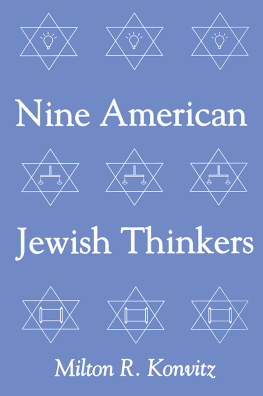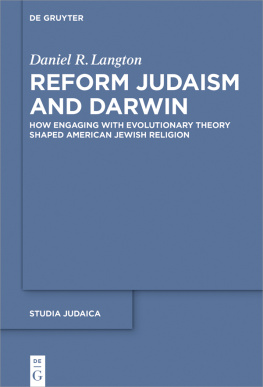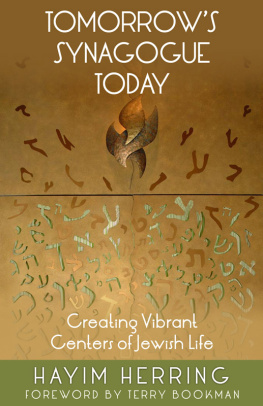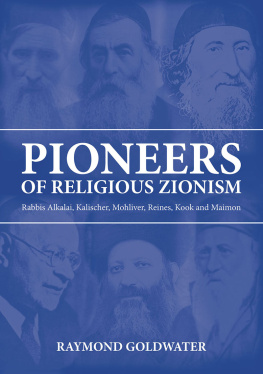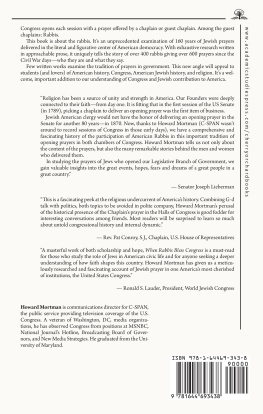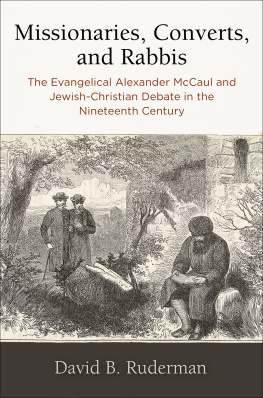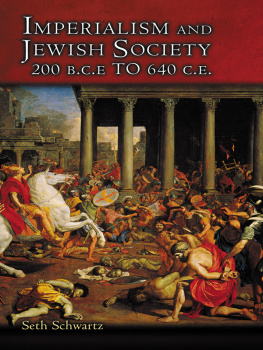Thank you for buying this ebook, published by NYU Press.
Sign up for our e-newsletters to receive information about forthcoming books, special discounts, and more!
Sign Up!
About NYU Press
A publisher of original scholarship since its founding in 1916, New York University Press Produces more than 100 new books each year, with a backlist of 3,000 titles in print. Working across the humanities and social sciences, NYU Press has award-winning lists in sociology, law, cultural and American studies, religion, American history, anthropology, politics, criminology, media and communication, literary studies, and psychology.
The Rabbis Wife
The Rabbis Wife
The Rebbetzin in American Jewish Life
Shuly Rubin Schwartz

NEW YORK UNIVERSITY PRESS
New York and London
www.nyupress.org
2006 by New York University
All rights reserved
Library of Congress Cataloging-in-Publication Data
Schwartz, Shuly Rubin.
The rabbis wife : the rebbetzin in American Jewish life / Shuly Rubin Schwartz
p. cm.
Includes bibliographical references and index.
ISBN-13: 978-0-8147-4016-3 (cloth : alk. paper)
ISBN-10: 0-8147-4016-2 (cloth : alk. paper)
1. Rabbis spousesUnited StatesHistory. 2. Rabbis spouses
United StatesIntellectual life. 3. Rabbis spousesUnited States
Religious life. I. Title.
BM652.S25 2005
296.61082dc22 2005019501
New York University Press books are printed on acid-free paper, and their binding materials are chosen for strength and durability.
Manufactured in the United States of America
10 9 8 7 6 5 4 3 2 1
Contents
Preface
And what will your role be? a member of the search committee would invariably ask me, when my rabbi husband interviewed for pulpits. For almost twenty-five years, I lived the life I have chosen to write about. Even before we married, I knew that Gershon planned to become a rabbi. Like so many of the women whose stories fill these pages, I imagined that I would become a Jewish educator as a fitting counterpart to his career as rabbi. After all, this was the model I had grown up with; my dad served as a congregational rabbi for his entire career while my mom taught religious school, reviewed Jewish books, and worked within the congregation to enhance the knowledge and Jewish commitments of its congregants. I knew firsthand what I was getting into when I married a future rabbi, and, over the years, I experienced both the highs and the lows of the rolejoys and resentments, feelings of fulfillment and anxietyjust as my own mother had.
In graduate school, I was drawn to Jewish history, and I chose to train professionally in that field rather than to become a Jewish educator. I also became a college dean and carved out a somewhat eclectic rebbetzin role. Though I helped found a synagogue babysitting co-op, delivered Torah talks for Sisterhood Shabbat, and entertained congregants on Shabbat and holidays, I also led lunch n learns, workshops, and scholar-in-residence weekends on topics in Jewish history.
Several years ago, I unexpectedly received in the mail a photo of me taken at a Commencement ceremony. I attend such exercises annually, and seeing a photo of myself in academic garb is hardly unusual. But the envelope read Rebbetzin Shuly Schwartz, and the photo was sent by a member of my husbands congregation whose niece had graduated that day. What a striking juxtaposition of those two roles! A thoughtful congregant extended herself to me as her rebbetzin, yet her reason for doing so stemmed from my professional identity and not my position as rabbis wife. This incident best captures the experience of my generation of rebbetzins. Professionals in our own right, we are nevertheless often defined in relation to our husbands career, an association that I generally enjoyed but one that complicated both my professional and my personal life.
In 2003, my husband, Gershon Schwartz, left the congregational rabbinate and began teaching rabbinical students. For the first time, both he and I began to discover the pleasures of serving the Jewish community without the added expectations of congregational life. Then, tragically, Gershon died unexpectedly less than a year later, and I found myself in the role of rabbis widow. I reread these pages with new eyes, acutely aware of my new status while struggling to complete revisions to a manuscript that focused on my old one.
The intertwining of personal and professional in my life epitomizes the conundrum I faced in undertaking this project. Initially inspired to examine this topic because of my experiences, I faced the challenge of writing about a topic close to home with the detachment of a historian. Being a rebbetzin myself, I had the insider perspective that gave me special insight into the complicated and multifaceted rebbetzin role. This enabled me to ask my interviewees probing questions and to elicit their honest, unguarded responses. Rebbetzins were eager to share their stories with someone who understood their perspective. Yet my love for rebbetzins as well as my concern for Jewish life also meant that I had to work doubly hard to maintain scholarly objectivity in my research and writing. A tricky balance, but I trust that I have maintained it. In so doing, I hope I have succeeded in telling the story of women whose accomplishments are so richly deserving of attention, both for their own sake and for the light they shed on American Jewish life.
Acknowledgments
This book has been more than a decade in the making, and I am pleased to acknowledge the assistance, encouragement, and support of the many individuals who helped make its completion possible.
First and foremost, I feel privileged to have had the opportunity to learn from many rabbis wives. My first goal in interviewing was to hear directly from the rebbetzins, and I am grateful to the many women who graciously agreed to speak with me, especially: Joan Lipnick Abelson, Hadassah Carlebach, Janet Chiel, Naomi Cohen, Sylvia Geffen, Rae Goodman, Blu Greenberg, Hilda Greenberg, Zipporah Jacobs, Reba Katz, Maurine Kessler, Eileen Kieffer, Edith Kling, Eudice Lorge, Zipporah Marans, Hadassah Nadich, Eveline Panitch, Louise Reichert, Lilly Routtenberg, Roz Stein, and Miriam Arzt Teplitz. I am also indebted to the women who participated in the Retired Spouses session of the 2000 National Association of Retired Reform Rabbis Convention and the Rabbis Wives session of the 2000 Rabbinical Assembly Retired Rabbis Convention. To supplement these stories and to learn about rebbetzins who had died, I also interviewed their congregants, family members and associates: Balfour Brickner, Irma and Abraham Cardozo, Judah Nadich, Jack and Jean Stein, David Waxman and Eve Keller, and Mordecai Waxman. I am grateful for the thoughtfulness and candor with which they reflected on the role of the rebbetzin and its place in their lives.
I am also indebted to the many individuals who generously shared personal files, family papers, correspondence, scrapbooks, and photos with me in the hope that I might be able to capture the essence of the rabbis wife role: Bailey Bloom, Balfour Brickner, Shulamith Elster, Jeremy Goldstein, Hilda Greenberg, Agnes Herman, Zipporah Jacobs, Reba Katz, Edith Kling, Sylvia Lieberman, Michael A. Meyer, Peggy Pearlstein, Marjorie Pressman, Aaron Reichel, Charlotte Rothman, Lilly Routtenberg, Hillel Silverman, Adrienne Sundheim, Helen Tomsky, Jonathan Waxman, and Miriam Wise.
Others also assisted me in tracking down sources, and I am grateful to them for their efforts. J. J. Schacter and Norman Lamm shared materials and insights on Irma Jung. Sara Sager shared recollections and helped me track down contacts on Rebecca Brickner. Joellyn Zollman alerted me to important materials by Miriam Wise. Marjorie Lehman shared materials on Tamar de Sola Pool. Jeffrey Gurock shared valuable sources from Yeshiva University. Mel Scult generously shared unpublished materials on Mathilde Schechter.
Next page

